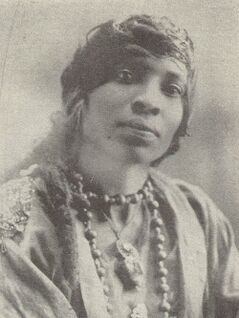
Madame Sul-Te-Wan (born Nellie Crawford; March 7, 1873 – February 1, 1959) was an American stage, film and television actress. The daughter of freed slaves, she began her career in entertainment touring the East Coast with various theatrical companies and moved to California to become a member of the fledgling film community. She became known as a character actress, appeared in high-profile films such as The Birth of a Nation (1915) and Intolerance (1916), and easily navigated the transition to the sound films.
Her career spanned over five decades, and, in 1986, she was inducted into the Black Filmmakers Hall of Fame. Sul-Te-Wan was the first African American actor, male or female, to sign a film contract and be a featured performer.
Nellie Crawford was born March 7, 1873 in Louisville, Kentucky, USA to freed slaves Cleon De Londa and Silas Crawford. Her father left the family early in her life, and her mother became a laundress who found employment working for Louisville stage actresses. Young Nellie became enchanted by watching the young actresses rehearse when she delivered laundry for her mother. When she was older she moved to Cincinnati, Ohio, joined a theatrical company called Three Black Cloaks, and began billing herself as Creole Nell. She also formed her own theatrical companies and toured the East Coast. After moving to California, Madame Sul-Te-Wan began her film career in uncredited roles in director D. W. Griffith's controversial 1915 drama Birth of a Nation and the colossal 1916 epic Intolerance. Sul-Te-Wan had allegedly written Griffith a letter of introduction after hearing that Griffith was shooting a film in her Kentucky hometown.
In the early 1900s, Sul-Te-Wan married Robert Reed Conley. They had three sons, but Conley abandoned his family when the third one was only three weeks old. Two of her sons, Odel and Onest Conley, would become actors and appear in several films during their careers, occasionally in films featuring their mother.
Following her roles for Griffith, Madame Sul-Te-Wan followed up in 1916 with a role in the Anita Loos-penned drama The Children Pay with young actress Lillian Gish and in 1917 with Gish's sister Dorothy in the Edward Morrissey-directed drama Stage Struck.
Throughout the 1910s and 1920s, Madame Sul-Te-Wan would establish herself as a rather publicly recognizable character actress, most often appearing in "Mammy" roles alongside such popular actors of the silent film era as Tom Mix, Leatrice Joy, Matt Moore, Mildred Harris, Harry Carey, Robert Harron, and Mae Marsh. Some of her most memorable roles of the era were in the 1927 James W. Horne-directed Buster Keaton comedy College, and in the 1929 Erich von Stroheim-directed drama Queen Kelly, starring Gloria Swanson.
Madame Sul-Te-Wan transitioned into the talkie era with relative ease and continued to appear in high-profile films alongside such prominent film actors as Conrad Nagel, Barbara Stanwyck, Fay Wray, Richard Barthelmess, Jane Wyman, Luise Rainer, Melvyn Douglas, Lucille Ball, Veronica Lake and Claudette Colbert. However, as a black woman in the era of segregation, she was consistently limited to appearing in roles as minor characters who were usually convicts, "native women", or domestic servants, such as her role as a "Native Handmaiden" in the 1933 box-office hit King Kong. Despite the motion picture industry's limitations for African-American performers, Sul-Te-Wan worked consistently throughout the 1930s and 1940s.
In 1937, Sul-Te-Wan was cast in the memorable role of Tituba in the film Maid of Salem, a dramatic retelling of the events surrounding of the Salem Witch Trials of 1692. The film starred Claudette Colbert, Fred MacMurray, Gale Sondergaard, Pedro de Cordoba, and Louise Dresser and was rather financially successful. Sul-Te-Wan's performance garnered critical praise.
On September 12, 1953, a banquet was held at the Hollywood Playground Auditorium to honor Madame Sul-Te-Wan by motion picture actors and film personalities. Amongst the 200 guests who attended the event were Louise Beavers, Rex Ingram, Mae Marsh, Eugene Pallette and Maude Eburne.
In 1954, Sul-Te-Wan appeared in the Otto Preminger directed and almost entirely African-American cast musical drama Carmen Jones opposite Dorothy Dandridge, Harry Belafonte, Diahann Carroll, and Pearl Bailey as Dandridge's grandmother. The film marked a departure for Sul-Te-Wan, who after appearing onscreen for over four decades, was finally able to act in a role that was atypical of her "Mammy" roles. The pairing of Dandridge and Sul-Te-Wan in Carmen Jones spawned a still widely believed but erroneous rumor—that Sul-Te-Wan was Dandridge's actual grandmother (some allege that she is Dandridge's great-grandmother). However, there is no merit to the claim and the two women are unrelated.
At age 77, Sul-Te-Wan married for the second time, to French interior designer Antone Ebenthur. The marriage lasted three years. During the 1950s, while in her 80s, she continued to appear onscreen in a number of well-received films, albeit now mostly in smaller bit parts and often uncredited. Her last screen appearance came in the 1958 Anthony Quinn-directed adventure film The Buccaneer, starring Yul Brynner and Charlton Heston.
On February 1, 1959, Madame Sul-Te-Wan died after suffering a stroke at the age of 85 at the Motion Picture Actors' Home in Woodland Hills, California. She was interred at the Pierce Brothers' Valhalla Memorial Park Cemetery in North Hollywood, Los Angeles County, California.
Sul-Te-Wan was inducted in the Black Filmmakers Hall of Fame in 1986.
Filmography[]
- Madame Sul-Te-Wan Fimography